Wayson Choy was a Canadian novelist. Publishing two novels and two memoirs in his lifetime, he is considered one of the most important pioneers of Asian Canadian literature in Canada, and as an important figure in LGBT literature as one of Canada's first openly gay writers of colour to achieve widespread mainstream success.
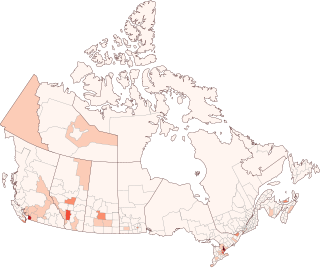
Chinese Canadians are Canadians of full or partial Han Chinese ancestry, which includes both naturalized Chinese immigrants and Canadian-born Chinese. They comprise a subgroup of East Asian Canadians which is a further subgroup of Asian Canadians. Demographic research tends to include immigrants from Mainland China, Taiwan, Hong Kong, and Macau, as well as overseas Chinese who have immigrated from Southeast Asia and South America into the broadly defined Chinese Canadian category.
Hiromi Goto is a Japanese-Canadian writer, editor, and instructor of creative writing.

Chinatown is a neighbourhood in Vancouver, British Columbia, and is Canada's largest Chinatown. Centred around Pender Street, it is surrounded by Gastown to the north, the Downtown financial and central business districts to the west, the Georgia Viaduct and the False Creek inlet to the south, the Downtown Eastside and the remnant of old Japantown to the northeast, and the residential neighbourhood of Strathcona to the southeast.
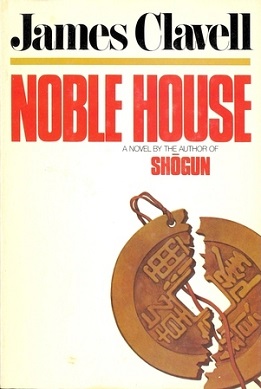
Noble House is a novel by James Clavell, published in 1981 and set in Hong Kong in 1963. It is the fourth book published in Clavell's Asian Saga and is chronologically the fifth book in the series. The "Noble House" in the title is the nickname of Struan's, the trading company first introduced in Clavell's Tai-Pan.
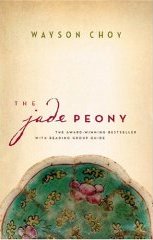
The Jade Peony is a novel by Wayson Choy. It was first published in 1995 by Douglas and McIntyre.
Gung Haggis Fat Choy is a cultural event originating from Vancouver, BC, Canada. The name is a combination wordplay on Scottish and Chinese words; haggis is a traditional Scottish food while Kung Hei Fat Choi is a traditional Cantonese greeting used during Chinese New Year.

Miss Chinese Vancouver Pageant, also known as MCV and formerly branded as Miss Chinese (Vancouver) Pageant, is an annual beauty pageant organized by Fairchild TV that selects Vancouver's representative for the annual Miss Chinese International Pageant that is held in Hong Kong, organized by TVB. The current Miss Chinese Vancouver is Isabella Zhai (翟悦迪) winner of the 2023 pageant.

Lisa See is an American writer and novelist. Her books include On Gold Mountain: The One-Hundred-Year Odyssey of My Chinese-American Family (1995), a detailed account of See's family history, and the novels Flower Net (1997), The Interior (1999), Dragon Bones (2003), Snow Flower and the Secret Fan (2005), Peony in Love (2007) and Shanghai Girls (2009), which made it to the 2010 New York Times bestseller list. Both Shanghai Girls and Snow Flower and the Secret Fan received honorable mentions from the Asian/Pacific American Awards for Literature.
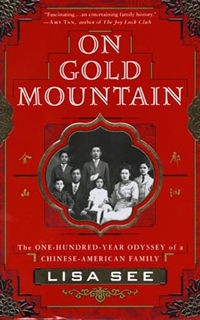
On Gold Mountain: The One-Hundred-Year Odyssey of My Chinese-American Family describes 100 years of author Lisa See's family history, providing a complex portrait of her family’s hard work, suffering, failures and successes as they moved from China to the United States. Speaking of the Chinese side of her family, See has said: "Things were so fractured and wild at home ... But the weekends with my grandparents became the real center for me ... It was the side of the family I identified more with. It was fun, romantic, solid".
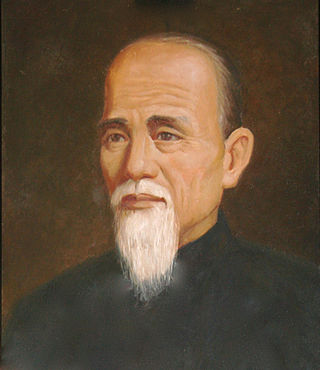
Chan Heung was the founder of the Choy Li Fut martial arts system.
Paul Yee is a Chinese-Canadian historian and writer. He is the author of many books for children, including Teach Me to Fly, Skyfighter, The Curses of Third Uncle, Dead Man's Gold, and Ghost Train—winner of the 1996 Governor General's Award for English language children's literature. In 2012, the Writers' Trust of Canada awarded Paul Yee the Vicky Metcalf Award for Literature for Young People in recognition of having "contributed uniquely and powerfully to our literary landscape over a writing career that spans almost 30 years".
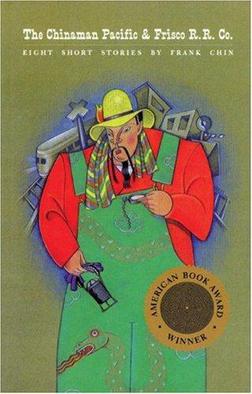
The Chinaman Pacific and Frisco R.R. Co. is a 1988 short-story collection by Frank Chin that collects many of the short stories he had published in the 1970s. It won the American Book Award. The collection deals with Chinese-American history by recalling the work of early Chinese immigrants in such jobs as "coolie, railworker and launderer".
One Hundred Years: History of the Chinese in America is a 1952 mural painting by James Leong.

Wong Foon Sien, also simply known as Foon Sien, was a Canadian journalist and labour activist. He devoted time to a number of civil and human rights organizations, was one of the early leaders of the Chinese Benevolent Association in Vancouver, and was "perhaps the most influential person" in the city's Chinatown. He was sometimes referred to as the "spokesman for Chinatown", or as "mayor of Chinatown" by Vancouverites, to the resentment of some Chinese Canadians in the community.
Karen Cho is a Chinese-Canadian documentary filmmaker from Montreal, Quebec, Canada. Her credits include the 2004 National Film Board of Canada (NFB) documentary In The Shadow Of Gold Mountain, documenting the effects of the Chinese Exclusion Act in Canada; the 2009 InformAction documentary Seeking Refuge; and the 2012 NFB documentary Status Quo? The Unfinished Business of Feminism in Canada, which was named best documentary at the Whistler Film Festival. Many of her films are political, featuring themes such as feminism and racism.
The history of Chinese Canadians in British Columbia began with the first recorded visit by Chinese people to North America in 1788. Some 30–40 men were employed as shipwrights at Nootka Sound in what is now British Columbia, to build the first European-type vessel in the Pacific Northwest, named the North West America. Large-scale immigration of Chinese began seventy years later with the advent of the Fraser Canyon Gold Rush of 1858. During the gold rush, settlements of Chinese grew in Victoria and New Westminster and the "capital of the Cariboo" Barkerville and numerous other towns, as well as throughout the colony's interior, where many communities were dominantly Chinese. In the 1880s, Chinese labour was contracted to build the Canadian Pacific Railway. Following this, many Chinese began to move eastward, establishing Chinatowns in several of the larger Canadian cities.
Jim Wong-Chu was a Canadian activist, community organizer, poet, author, editor, and historian. Wong-Chu is one of Canada's most celebrated literary pioneers. He was a community organizer known for his work in establishing organizations that contributed to highlighting Asian arts and culture in Canada. He also co-edited several anthologies featuring Asian Canadian writers.

The Kuomintang Building, also known as the Chinese Nationalist League Building, is a historic four-storey building in Vancouver, British Columbia, Canada. It is located in the southeast corner of the city's Chinatown, at the intersection of Gore Avenue and Pender Street. Opened in 1921, it originally served as the Western Canadian headquarters of the Kuomintang, a Chinese nationalist organization. The Chinese Nationalist League of Canada, the Kuomintang's affiliate in the country, was the original owner of the building. The building has historically been used for various social and commercial functions in addition to political activities.











